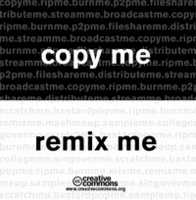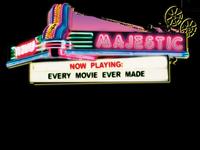| Thursday, April 7, 2005 |  |
|
|
|
 Very nice set of notes at WorldChanging about a speech Bruce Sterling and Alex Steffen gave at the SXSW conference a few weeks ago, where they ran through a bunch of big global problems and possible sustainable and technological solutions to them. A few of the concepts discussed: Very nice set of notes at WorldChanging about a speech Bruce Sterling and Alex Steffen gave at the SXSW conference a few weeks ago, where they ran through a bunch of big global problems and possible sustainable and technological solutions to them. A few of the concepts discussed:
- Protocrats: Who will be creating a sustainable future, and what will we call them? "There's an electronic conjulation of smaller groups that are living in one another's laps, trading info across institutional boundaries, move things fast and punting developments into mass consumption," Bruce said. He calls these people "protocrats" - green designer/instantiators ahead of the curve on developing new technologies, pushing them beyond labs and into mass development.
- Alex introduced a range of concepts that will be familiar to WC readers, but were new to much of the SXSW audience, including ecological footprinting; urban design and green megacities; and the sharing of objects and resources, known as product- service systems.
- Bruce looked at three approaches to making objects sustainable:
1. Neobiology and biomimetics: when you lose it, it rots.
2. Build monuments for the ages. Abandon fashion. It'll be artsy and craftsy, roughhewn and honest - but you don't get to change your mind about it.
3. Label everything in the environment and digitally track it. Give everything a unique identity, and make the bar code searchable. Track it throughout its lifetime, from manufacture to disassembly and material recovery. When it breaks, push a button and somebody picks it up. This is the Internet of Things. It would require plenty of bandwidth, tracking, extensive databases, and (of course) a remake of the entire social, legal, and economic system, "which happens all the time". - Leapfrogging: Under certain conditions, people who are technologically underdeveloped might skip a stage and jump to the next, newer technology (see Jamais' "Leapfrogging 101").
- Treefrogging: The emergence of bright green solutions for personal use, as outlined by WC allies Metaefficient and Treehugger. Distinct from LOHAS-type alternatives (Lifestyles of Health and Sustainability, as typified by Whole Foods, or Natural Home Magazine), this is the creation and distribution of new design concepts. As with the Solar Backpack concept that Bruce test-drove for Treehugger, good ideas can now be picked up and produced on demand. "Throw it over the side to the piranhas of bloggerland!"
- Monitoring: In cities: for checking emissions, controlling traffic on highways. Don't expect drivers to do all the navigation. In the human body: monitoring bioaccumulation of lead, or jet fuel, in your cells. "What if the shower told you that you've got a suspiciously large amount of jet fuel in your body today? You'd wonder who the hell spilled the jet fuel." Of objects: material composition, location, off-gassing, pollution; the double-edged sword of RFID tagging and tracking of objects.
[ Information | 2005-04-07 13:17 | | PermaLink ] More >
|
|
| Monday, March 28, 2005 |  |
|
|
|
ZoomInfo is a brand new site that claims to produce people's resumes automatically by crawling the web and figuring out what information is relevant. Article here.
Now, that's rather amusing. I try with my own name, of course. It has 12 entries, all of which are me. The first one isn't half bad. Well, it is. It would be useless as my resume, but it is intriguing what it found. It identifies me primarily as a Board Member of "Web Angesl". Should be "Web Angels", I'm sure. Not that I remember joining any such thing. I guess that is is a workgroup within NCN that wanted to give me an honorable mention. Maybe more appropriate it also identifies me as founder of NCN, although it is as my "Past Employment History". And, quite impressively, it identified me as an Advisory Board Member of the Institute for the Study of Accelerating Change. I had forgotten all about that. Anyway, it also found some other snippets of biographical information about me. And an interview.
Amusingly, it labels all of these sites as "companies" and everybody it finds related to them as "employees".
I don't think this is really going to work. But I'm impressed that somebody will try to do this and that it is even partly in the right ballpark.
[ Information | 2005-03-28 01:20 | | PermaLink ] More >
|
|
| Saturday, March 26, 2005 |  |
|
|
|
 Via Kim, a list of U.S. government patents from Illuminati News. Patents for a variety of technologies obviously meant to control your behavior. The links go to the actual patent records with the Patent and Trademark Office. Via Kim, a list of U.S. government patents from Illuminati News. Patents for a variety of technologies obviously meant to control your behavior. The links go to the actual patent records with the Patent and Trademark Office. - Patent 3,951,134 - Apparatus and method for remotely monitoring and altering brain waves
- Patent 4,717,343 - Method of Changing Person's Behavior
- Patent 4,877,027 - Hearing System
- Patent 5,123,899 - Method and System for Altering Consciousness
- Patent 5,159,703 - Silent Subliminal Presentation System
- Patent 5,270,800 - Subliminal Message Generator
- Patent 5,507,291 - Method and an Associated Apparatus for Remotely Determining information as to Person's Emotional State
- Patent 5,539,705 - Ultrasonic Speech Translator and Communications System
- Patent 5,629,678 - Personal Tracking and Recovery System
- Patent 5,760,692 - Intra-oral Tracking Device
- Patent 5,878,155 - Method for verifying human identity during electronic sale transactions
- Patent 5,905,461 - Global Positioning Satellite Tracking Device
- Patent 5,935,054 - Magnetic excitation of Sensory Resonances
- Patent 5,952,600 - Engine Disabling Weapon
- Patent 6,006,188 - Speech Signal Processing for Determining Psychological or Physiological Characteristics Using a Knowledge Base
- Patent 6,014,080 - Body Worn Active and Passive Tracking Device
- Patent 6,017,302 - Subliminal Acoustic Manipulation of Nervous System
- Patent 6,051,594 - Methods and Formulations for Modulating the Human Sexual Response
Gee, I'm glad they protected their intellectual property before this stuff fell into the wrong hands. Oh, no, too late. I'm ... feeling ... a little ... disoriented.
[ Information | 2005-03-26 15:19 | | PermaLink ] More >
|
|
| Friday, March 25, 2005 |  |
|
|
|
 Yahoo has a new search feature, for materials with Creative Commons licenses. I.e. typically stuff you can use freely if you just mention where they come from, or maybe that you can only use non-commercially. Yahoo has a new search feature, for materials with Creative Commons licenses. I.e. typically stuff you can use freely if you just mention where they come from, or maybe that you can only use non-commercially.
Wait, how do they know? I search for my own blog, and it came up with a page here where indeed I mentioned that I consider what I write here to be in the public domain. Really, what I should do should be to put a proper CC image and link here that says so. I've so far labeled it as Primarily Public Domain which really fits best. But I like the idea that a formalized piece of xml will be allow various services to automatically find content with a certain license or dedication. So, I've added the public domain code from CC in my sidebar now.
Anyway, there's a growing number of ways one can search for liberally licensed content.
America Free TV gives you online streaming video programming like that.
OurMedia offers free hosting for CC licensed media.
Of course Creative Commons itself has a search.
Flickr lets you search for pictures based on their licenses. Flickr who btw was bought by Yahoo this week, who promises to let them keep doing what they're doing.
I'm sure there are others.
[ Information | 2005-03-25 17:00 | | PermaLink ] More >
|
|
| Friday, March 18, 2005 |  |
|
|
|
How refreshing. New Scientist has an article about 13 phenomena that can't yet be explained by science, and yet they can't be denied. Here's a couple of my favorites: 1. The placebo effect
DON'T try this at home. Several times a day, for several days, you induce pain in someone. You control the pain with morphine until the final day of the experiment, when you replace the morphine with saline solution. Guess what? The saline takes the pain away.
This is the placebo effect: somehow, sometimes, a whole lot of nothing can be very powerful. Except it's not quite nothing. When Fabrizio Benedetti of the University of Turin in Italy carried out the above experiment, he added a final twist by adding naloxone, a drug that blocks the effects of morphine, to the saline. The shocking result? The pain-relieving power of saline solution disappeared.
So what is going on? Doctors have known about the placebo effect for decades, and the naloxone result seems to show that the placebo effect is somehow biochemical. But apart from that, we simply don't know.
Benedetti has since shown that a saline placebo can also reduce tremors and muscle stiffness in people with Parkinson's disease (Nature Neuroscience, vol 7, p 587). He and his team measured the activity of neurons in the patients' brains as they administered the saline. They found that individual neurons in the subthalamic nucleus (a common target for surgical attempts to relieve Parkinson's symptoms) began to fire less often when the saline was given, and with fewer "bursts" of firing - another feature associated with Parkinson's. The neuron activity decreased at the same time as the symptoms improved: the saline was definitely doing something.
We have a lot to learn about what is happening here, Benedetti says, but one thing is clear: the mind can affect the body's biochemistry. "The relationship between expectation and therapeutic outcome is a wonderful model to understand mind-body interaction," he says. Researchers now need to identify when and where placebo works. There may be diseases in which it has no effect. There may be a common mechanism in different illnesses. As yet, we just don't know.
4. Belfast homeopathy results
MADELEINE Ennis, a pharmacologist at Queen's University, Belfast, was the scourge of homeopathy. She railed against its claims that a chemical remedy could be diluted to the point where a sample was unlikely to contain a single molecule of anything but water, and yet still have a healing effect. Until, that is, she set out to prove once and for all that homeopathy was bunkum.
In her most recent paper, Ennis describes how her team looked at the effects of ultra-dilute solutions of histamine on human white blood cells involved in inflammation. These "basophils" release histamine when the cells are under attack. Once released, the histamine stops them releasing any more. The study, replicated in four different labs, found that homeopathic solutions - so dilute that they probably didn't contain a single histamine molecule - worked just like histamine. Ennis might not be happy with the homeopaths' claims, but she admits that an effect cannot be ruled out.
So how could it happen? Homeopaths prepare their remedies by dissolving things like charcoal, deadly nightshade or spider venom in ethanol, and then diluting this "mother tincture" in water again and again. No matter what the level of dilution, homeopaths claim, the original remedy leaves some kind of imprint on the water molecules. Thus, however dilute the solution becomes, it is still imbued with the properties of the remedy.
You can understand why Ennis remains sceptical. And it remains true that no homeopathic remedy has ever been shown to work in a large randomised placebo-controlled clinical trial. But the Belfast study (Inflammation Research, vol 53, p 181) suggests that something is going on. "We are," Ennis says in her paper, "unable to explain our findings and are reporting them to encourage others to investigate this phenomenon." If the results turn out to be real, she says, the implications are profound: we may have to rewrite physics and chemistry. Well, you've better start writing. Other points covered are The horizon problem, Ultra-energetic cosmic rays, Dark matter, Viking's methane, Tetraneutrons, The Pioneer anomaly, Dark energy, The Kuiper cliff, The Wow signal, Not-so-constant constants, and Cold fusion.
[ Information | 2005-03-18 14:38 | | PermaLink ] More >
|
|
| Thursday, March 17, 2005 |  |
|
|
|
Software patents is a crazy obstacle in software development. In many jurisdictions one can "patent" some operation one does in software, like being able to sell books by one click, or using two clicks to select something. All of which makes it very difficult for a programmer to just solve some problem the logical way, as one in principle needs an army of lawyers to first verify that one didn't accidentally violate somebody's patent. Now, one way of seeing the sillyness in this is to consider what would happen if one could acquire patents on literature. Kuro5hin article here.Arthur Conan Doyle's patent on detective fiction would have expired long ago, but not before preventing Agatha Christie's career. C.S. Lewis' patent on the fantasy novel would have discouraged Tolkien's already reluctant publishers. Without this inspiration, the fantasy trilogies that fill an entire wall in every bookshop would never have been written.
Today we would have patents on smaller and smaller points of style or story. Every opening scene, every surprise ending, every combination of characters, every imaginative sex scene would be protected by a patent.
How could any budding author know what story ideas were already 'owned'? No one could expect him to have read every novel published in the previous 25 years! His profession would have become a minefield. Every day he would fear some lawyer 'discovering' that the hero of his latest story was actually covered by a patent owned by an author he'd never heard of, from a book he'd never read. See, that's really the same thing. The idea of a patent made some sense when we were talking about physical devices, and it was reasonable to give the inventor a few years to develop it themselves, before their competitiors could just copy it. But it becomes insanity when we're talking about simple and obvious software development techniques. Just like it would be crazy if I could patent a sentence in the English language, or a plot point in a book.
[ Information | 2005-03-17 13:14 | | PermaLink ] More >
|
|
| Monday, March 14, 2005 |  |
|
|
|
Every year the US State Department releases a report on the state of human rights in various countries. All countries except for the US, basically. So, to compensate for that lack, China's State Council Information Office releases a report on the state of human rights in the U.S. Which doesn't look particularly good. See an article about the report here. Here are a few scattered highlights: American society is characterized with rampant violent crimes, severe infringement of people's rights by law enforcement departments and lack of guarantee for people's rights to life, liberty and security of person. ..
A survey found that in the 17 years from 1985 to 2002, Los Angeles recorded more than 100 times increase in police shooting at automobile drivers, killing at least 25 and injuring more than 30 of them. Of these cases, 90 percent were due to misjudgment. (The Los Angeles Times, Feb. 29, 2004.) ..
The United States characterizes itself as "a paradise for free people," but the ratio of its citizens deprived of freedom has remained among the highest in the world. Statistics released by the Federal Bureau of Investigation last November showed that the nation made an estimated 13.6 million arrests in 2003. The national arrest rate was 4,695.1 arrests per 100,000 people, 0.2 percent up than that of the previous year (USA Today, Nov. 8, 2004). ..
Jails have become one of the huge and most lucrative industries,with a combined staff of more than 530,000 and being the second largest employer in the United States only after the General Motors. Private prisons are more and more common. The country now has over 100 private prisons in 27 states and 18 private prison companies. The value of goods and services created by inmates surged from 400 million US dollars in 1980 to 1.1 billion US dollars in 1994.
Abuse of prisoners and violence occur frequently in US jails and prisons, which are under disorderly management. The Los Angeles Times reported on Aug. 15 last year that over 40 state prison systems were once under some form of court order, for brutality, crowding, poor food and lack of medical care. .. It goes on and on. Voting, heathcare, poverty, racial issues, gender issues, war crimes. Pervasive and serious problems in all of them. And it seems to be basically correct. The United States as a bastion of freedom and human rights is a bit of a joke. But one that tends to be believed not only by most U.S. citizens, but also by most of the rest of the world. But it isn't particularly true. There are certainly more oppressive places one can live. And, yes, you can in principle walk around freely and think what you want, as you can in most places. And if you're a member of the upper classes, you might find a lot of freedom to do your thing in the U.S. But as far as the overall freedom and human rights situation in many areas, I'm afraid the U.S. would be pretty far down the list. The more embarrassing thing is that it takes China to make such a report. China which of course has its own problems, still being essentially a totalitarian state, even if a rapidly transforming one.
[ Information | 2005-03-14 10:59 | | PermaLink ] More >
|
|
| Saturday, March 12, 2005 |  |
|
|
|
 Terry Heaton: Terry Heaton:What happens when customers ultimately reject advertising? Well, it is a bit of a mystery why companies still throw that much into advertising. I can't remember the last time I bought anything based on an ad. There could be so much better ways for sellers to talk with buyers. It can only be a matter of time before somebody notices they're wasting their money, or, yes, that the customers get used to ways of completely avoiding the ads.
Doc Searls:Every time I watch TV I notice a strangely — even precipitously — high percentage of ads for automobiles. So I wonder, What would happen if all those advertisers suddenly decide (perhaps because they notice they're advertising mostly to maintain spending parity) to stop advertising on TV?
At some point the woeful inefficiency of spending large amounts of money to "reach" people who aren't watching (or don't care, or hate suffering annoying and irrelevant "messages") will make its own case against TV Advertising As We Know It.
At some point, mass market advertisers will start conversing with, and relating to, customers. Inevitably, they'll discover how much more leveraged that is than spraying "messages" at "consumers" through "channels" between "content" that viewers would rather watch without messages. Which would certainly be a good thing. But it requires drastic transformation of all media that are financed by those ads. Television, newspapers, many websites. They have to think of other ways of being in the loop.
[ Information | 2005-03-12 17:44 | | PermaLink ] More >
|
|
| Saturday, February 19, 2005 |  |
|
|
|
 Ah, I knew somebody had to be doing that. NY Times article (registration required): Ah, I knew somebody had to be doing that. NY Times article (registration required): Vehicles that move slowly down the street, pausing regularly to take photographs with remote-controlled cameras, tend to make the police a bit nervous. But one trailer loaded with imaging equipment that made its way through the streets of central Philadelphia wasn't spying - although at first, Secret Service agents had their doubts.
Both the vehicle and a plane that flew over the same area were taking authorized pictures of each building and its surroundings, at the behest of the downtown improvement district. Now the terabytes of imaging data are being used to build a three-dimensional model of central Philadelphia, down to the last cornice, mailbox and shrub.
The city model can then be integrated with other information, like listings of shops and rental space, so that one day people who'd rather be in Philadelphia will be able to be there virtually, from their computers. Apartment seekers, for example, will be able to click their way through the neighborhood, taking a virtual walk and checking out the view from the windows of apartments that strike their fancy.
$150,000 per square kilometer for the process of virtualizing a city. Involves a laser scanner, digital phographs from all angles, including above, and GPS positioning. And a lot of processing. The inventor of that particular approach has some stupid reasons for why it is a great thing, like that virtual art galleries would be a great place to meet people. Duh, maybe, but they don't have to be painstakingly digitized from real art galleries. No, it is the increased dimensions and new possibilities that is what is cool. I could get to know a city much faster by flying through it in a 3D simulation than if I had to take the bus and see it all out the window. I could shop for neighborhoods to live in much faster. I could check out a place I'm going, or the route to get there, before I leave. I can be in several places at once, and experience them more completely, ironically, than I could just by being there. So where can we see this thing? There's a demo here.
[ Information | 2005-02-19 23:18 | | PermaLink ] More >
|
|
| Sunday, February 6, 2005 |  |
|
|
|
 The Economist has a little article on The economics of sharing. It has some good stuff. It is also somewhat amusing to hear about economists pulling their hair out trying to understand why people share, when they're supposed to just be self-serving consumers and capitalists. The Economist has a little article on The economics of sharing. It has some good stuff. It is also somewhat amusing to hear about economists pulling their hair out trying to understand why people share, when they're supposed to just be self-serving consumers and capitalists.Economists have not always found it easy to explain why self-interested people would freely share scarce, privately owned resources. Their understanding, though, is much clearer than it was 20 or 30 years ago: co-operation, especially when repeated, can breed reciprocity and trust, to the benefit of all. In the context of open source, much has been written about why people would share technical talent, giving away something that they also sell by holding a job in the information-technology industry. The reason often seems to be that writing open-source software increases the authors' prestige among their peers or gains them experience that might help them in the job market, not to mention that they also find it fun.
Seems like one can't get around the subject any longer, when talking about economics. And the interesting part remains how and how quickly and widely sharing will spread to more tangible goods. The question is, can sharing be used to supply more than just information? One of the most articulate proponents of the open-source approach, Yochai Benkler of Yale Law School, argues in a recent paper that sharing is emerging for certain physical, rivalrous goods and will probably increase due to advances in technology. Where open source was about sharing information by way of the internet, what is happening now, Mr Benkler notes, is the sharing of the tangible tools of technology themselves, like computing power and bandwidth. This is because they are widely distributed among individuals, and sold in such a way that there is inherent (and abundant) unused capacity.
He's talking about social sharing as a "third mode of organising economic production, alongside markets and the state". Well, maybe we can call it that. But the networks for sharing are also a market. Just a market that measures value somewhat differently.
It is an interesting, even if obvious, key point that sharing is most likely to emerge when something is available that has inherent and abundant unused capacity. Probably isn't important that it is sold. It is important that there's an abundance of something, and some kind of informational system exists that allows some of that abundance to be directed to where else it might be needed and appreciated.
For that matter, that little phenomenon could be the basis of a whole new kind of civilization. The networking of excess capacity. That's what a traditional market does too, but from a very different angle. A guy who owns a factory figures out how to finance the cheap production of millions of widgets, and he gets them into the hands of people who want them, and gets paid for it. Wheras the sharing phenomenon tends to start off with stuff that's somehow already paid for, or that is perceived to be. I've already gathered my MP3 collection, and I'm paying for my DSL line anyway, so if somebody can use some of it, even if I get nothing directly out of it, that's fine.
Better information and better networking will make more things sharable. If somebody came up with something that would scan the titles of my old books and found takers for them automatically, I might not throw them away. If somebody comes up with a sufficiently efficient way of sharing cars, and always being able to find one close by, I wouldn't need to own one. Several companies are already doing that pretty well in certain limited areas.
Seems like it is not just that there are economic markets and there is open source sharing. Most likely more hybrids will pop up.
There are some very different basic aims involved, which wouldn't really have to be that different. There's the traditional capitalist motivation where you mass produce something as cheaply as possible and you "share" it in a direct one-to-one exchange with people who want it. Your aim was profitable exchange, but not really the sharing as such. And then there's the more open source kind of thinking, where you try to come up with something that is as easily sharable as possible. And then you secondarily might derive income from the increased advantages that come from that.
The focus is switching towards drawing economic advantage from the flow of stuff from where it is abundant to where it isn't, as opposed to from taking payment for the stuff itself. Like, information is becoming very free and freely available, but there's a business in making a search engine that finds it for you, even if it is just by serving you some ads along with it.
Really it isn't as new as it seems. When Exxon sells you some oil, it is really only because they found it lying around somewhere, and they took it and brought it to you, and it would have been difficult for you to do that yourself. But they didn't make it, they just took it and pretended they owned it. Most economic engines start off with something like that, even if it is made to look a lot more complicated. Generally somebody grabbed something that was lying around and processed it somehow and transported it to you, and they pretend they made it and they own it, and therefore you have to pay. Where really it is more the processing and transportation they did. The farmer didn't invent pigs. He just fed them for a while, loaded them in a truck, took them to the butcher, etc. The newspaper is printed on paper made from trees pulled out of the ground and transported. Not by anybody who truly owned those trees in the universal scheme of things, just by somebody who pretended they did.
So we could say that the sharing mentality rather starts with the idea that things are inherently free. Or we can see it the other way. Nothing is really ours, it is all stuff that comes from somewhere else, that we temporarily have use of. My music files, my ideas, my computer bandwidth. It is all coming from somewhere else that I don't quite control.
Good will, gratitude, reputation, prestige, cooperation - those are qualities that emerge when we take ownership and control out of the equation. Are they more natural? I don't know, I'd like to think so. But even if that wasn't a given, and even if they aren't inherently stronger forces than greed and control, things can very well be arranged so that they will dominate the playing field.
One can produce things so that they inherently aren't owned. Some free software licenses will specify that the software has to remain free, and you have to pass on the same license if you improve on them. Thus there's no power in direct ownership any longer, and you're instead forced to traffic in the economy of good will and recognition of good work.
More tangible products could be made in a similar fashion. Again, we're seeing it first with information products. You can make a song and give it a license that specifies that it has to remain free, but that you always want to be credited for it. So the only way people have of generating value is not by owning it, but by sharing it, talking about it, improving it, categorizing it, etc. They might be paid for that, but they can't ever be paid for owning it.
Sharing and things being free aren't the same thing of course. I'd like everything to be free, but that's a more long-term project than sharing is. Sharing doesn't mean things don't cost anything. Just that the value of something can be leveraged by sharing it.
Can bicycles be free? It is possible. But it is more likely that somebody makes a scheme that lets me pay a little bit every month and that bicycles then become abundant, so I don't have to worry much about holding on to one.
The new thing is the potential to base economics on the sharing of abundance, rather than the metered access to scarcity. With some luck the economists will make some more calculations and realize that there's much more profit to be made by creating and sharing abundance than there is in reluctantly selling scarce items. Because, well, there's a scarcity of scarcities, but there's unlimited potential in abundance and new ways of sharing.
[ Information | 2005-02-06 03:41 | | PermaLink ] More >
|
|
| Thursday, January 27, 2005 |  |
|
|
|
 The world's central banks have begun, slowly and carefully, to switch away from the dollar, to more stable currencies. See Financial Times. That is no small matter. It is a long story, but, in brief, most countries keep large amounts of dollars in reserve. Dollars that nothing gets bought for, but that are kept, well, as reserves, and because some important commodies, like oil, are sold almost exclusively in dollars. And, ok, it is not that those dollars aren't used, but there's continuously a very large amount of them that are not. Which is what allows the U.S economy to run with a huge deficit, in a way that no other economy can. Normally a country has to have an approximate balance in what it exports and imports. But the fact that lots of countries keep US dollars that they've paid for, but which they aren't getting goods for, allows the US to import way way more than it exports, and to a large degree to get it simply by the act of printing money, or, rather, moving some numbers around in computers. If the dollar wasn't used in such a manner, the US economy would be unsustainable, and might have to crash. Anyway, the global system is so tied together that none of those other central banks would really want that. But they also want their reserves to be stable, so they slowly change things. And mostly they speak very diplomatically about it. Maybe a little less so the Chinese guy in Davos this week: The world's central banks have begun, slowly and carefully, to switch away from the dollar, to more stable currencies. See Financial Times. That is no small matter. It is a long story, but, in brief, most countries keep large amounts of dollars in reserve. Dollars that nothing gets bought for, but that are kept, well, as reserves, and because some important commodies, like oil, are sold almost exclusively in dollars. And, ok, it is not that those dollars aren't used, but there's continuously a very large amount of them that are not. Which is what allows the U.S economy to run with a huge deficit, in a way that no other economy can. Normally a country has to have an approximate balance in what it exports and imports. But the fact that lots of countries keep US dollars that they've paid for, but which they aren't getting goods for, allows the US to import way way more than it exports, and to a large degree to get it simply by the act of printing money, or, rather, moving some numbers around in computers. If the dollar wasn't used in such a manner, the US economy would be unsustainable, and might have to crash. Anyway, the global system is so tied together that none of those other central banks would really want that. But they also want their reserves to be stable, so they slowly change things. And mostly they speak very diplomatically about it. Maybe a little less so the Chinese guy in Davos this week:"The U.S. dollar is no longer -- in our opinion is no longer -- (seen) as a stable currency, and is devaluating all the time, and that's putting troubles all the time... So the real issue is how to change the regime from a U.S. dollar pegging ... to a more manageable ... reference ... say Euros, yen, dollars -- those kind of more diversified systems ... If you do this, in the beginning you have some kind of initial shock. You have to deal with some devaluation pressures."
Now, even though I'd find a certain enjoyment in looking forward to being able to blame a crashing US economy on the suicidal fiscal policies of Bush's regime, I also get paid most of the time in dollars. Which are worth crap right now. So it is not entirely a good thing that it will get worse. Actually it is worse for anybody who uses dollars outside the U.S. than inside, where, I'm sure, things seem pretty normal.
[ Information | 2005-01-27 23:06 | | PermaLink ] More >
|
|
| Wednesday, December 8, 2004 |  |
|
|
|
 Here's ArtPad, another very cool Flash painting application. Like the one from GE. I want that on my server. I'm sure they're not sharing, though. Here's ArtPad, another very cool Flash painting application. Like the one from GE. I want that on my server. I'm sure they're not sharing, though.
[ Information | 2004-12-08 17:10 | | PermaLink ] More >
|
|
| Saturday, November 20, 2004 |  |
|
|
|
If you're in the U.S., it might soon be illegal to skip commercials on TV programs. Unbelievable? Unfortunately not. Here's one article:Do you like fast-forwarding through commercials on a television program you’ve recorded? How much do you like it? Enough to go to jail if you’re caught doing it? If a new copyright and intellectual property omnibus bill sitting on Congress’s desk passes, that may be the choice you'll face.
How can this be possible? Because language that makes fast-forwarding through commercials illegal—no doubt inserted at the behest of lobbyists for the advertising industry—was inserted into a bill that would allow people to fast forward past objectionable sections of a recorded movie (and I bet you already thought that was OK). And that’s but one, albeit scary, scenario that may come to pass if the Intellectual Property Protection Act is enacted into law.
There's an Induce Act Blog about this and related monstrous copyright laws in the process of being enacted by corrupt politicians. And see various kinds of information from EFF.
[ Information | 2004-11-20 17:05 | 0 comments | PermaLink ]
|
|
|
|
 Thomas made a Toulouse Wiki. For mostly english-speaking people to gather what they know about the town of Toulouse. Great idea. I promptly went and added a couple of things, like a link to myself. Thomas made a Toulouse Wiki. For mostly english-speaking people to gather what they know about the town of Toulouse. Great idea. I promptly went and added a couple of things, like a link to myself.
Browsing around, seeing what other people had added, I noticed the link to the Wikipedia page about Toulouse, which I hadn't seen before. And it gives an absolutely excellent overview of what the city is about, with important facts and figures and recently history.
Toulouse is the 4th largest city in France, and the largest growing metropolitan area in Europe for a city around a million inhabitants. That to a large degree is because it is the center of the European aerospace industy, and also a big bio-tech center.
Toulouse has at various times in the last couple of thousand years been an important metropolis. But, interestingly, Toulouse was largely overlooked by the industrial revolution. So, in the 18th and 19th centuries it became just a sleepy, decaying provincial town. That's all different today, and is now a great asset, as there's no polluting heavy industry here at all. I'm so glad I didn't choose Lyon.
[ Information | 2004-11-20 15:45 | | PermaLink ] More >
|
|
| Thursday, October 7, 2004 |  |
|
|
|
 BoingBoing mention of current Wired article The Long Tail, about how, in the online world, there's now a viable market for lots of books and movies that aren't bestsellers or hits, and that you wouldn't find at Blockbusters or Barnes and Nobles. All those items far down the list of the top 500,000 books or films. That would be the "long tail". And if they don't need to actually be stocked in an actual store, and if clever search technologies, like Amazon's recommendations, make them easy to find, there's no reason not to sell them. And one might actually find that, put together, those fringe items outsell the hits. Summary: BoingBoing mention of current Wired article The Long Tail, about how, in the online world, there's now a viable market for lots of books and movies that aren't bestsellers or hits, and that you wouldn't find at Blockbusters or Barnes and Nobles. All those items far down the list of the top 500,000 books or films. That would be the "long tail". And if they don't need to actually be stocked in an actual store, and if clever search technologies, like Amazon's recommendations, make them easy to find, there's no reason not to sell them. And one might actually find that, put together, those fringe items outsell the hits. Summary:Short form: The rise of online distribution and its unlimited shelf space is leading to a dramatic shift in the entertainment business from hit-driven economics to niche-driven economics. Content that was once relegated to the fringe, beneath the threshold of commercial viability, is now increasingly able to find a market in distributed audiences. The interesting work is now in finding way to push demand down the Long Tail. None of this should be any kind of surprise to anybody paying attention to the internet. Of course we want access to everything ever made, and if it is out there, there will be somebody who's interested in it. Duh. I guess the guy's mostly preaching some marketing speech to media and book companies, to tell them they can make money and be a little more hip by forking over more of what they're sitting on. And he gives examples of people who've done that. And his advice to them is decent: Make everything available. Make it cheap. Make it really easy to find.
Really, some more fundamental things need to change. A free market is to deliver what people want for what they're willing to pay for it. And it has certain inherent mechanisms for adjusting these things. In a free market it is a no-brainer to make available everything that it is possible to make available, and to make it attractive for people to pay for it. But the media companies are instead operating from a monopoly position, deliberately limiting the supply and forcing artificially high prices to be paid for imaginary services. Changing that takes more than just having them realize how they can make money by doing it with more of their inventory. But a good start, maybe.
And, yeah, I want equal access to every movie, tv-show and book ever written.
[ Information | 2004-10-07 20:25 | | PermaLink ] More >
|
|
|
|
 Via Slashdot a couple of excellent articles from Mark Pesce on Big Media versus Peer-to-Peer Media. Redefining Television and Rolling your own Network. Years ago Mark was the main inventor of the VRML standard for 3D graphics. He's an inspiring fellow in many other areas now, like here on media activism. His last name is said like "Peshee", btw. I only met him once, and I accidentally called him "Pesky". Anyway, he's in Australia now. So, first of all, there are some media organizations that actually are starting to do the right thing: Via Slashdot a couple of excellent articles from Mark Pesce on Big Media versus Peer-to-Peer Media. Redefining Television and Rolling your own Network. Years ago Mark was the main inventor of the VRML standard for 3D graphics. He's an inspiring fellow in many other areas now, like here on media activism. His last name is said like "Peshee", btw. I only met him once, and I accidentally called him "Pesky". Anyway, he's in Australia now. So, first of all, there are some media organizations that actually are starting to do the right thing: The BBC doesn't have the bandwidth to netcast its programming to all 66 million of its viewers. Fortunately it doesn't that kind of capability, because the BBC has cleverly designed the Flexible TV application to act as a node in a Peer-to-Peer network. Anyone using Flexible TV has access to the programs which have been downloaded by any other Flexible TV client, and can get those programs directly from them. All BBC need do is provide a single copy of a program into the network of P2P clients, and they handle the work themselves. More than this, because of the P2P technology used by the BBC .. a Flexible TV user can get a little bit of the program from any number of other peers; rather than going through the process of downloading an entire program from one other peer, the Flexible TV client can ask a hundred other clients for small sections of the program, and download these hundred sections simultaneously. Not only does this decrease the amount of traffic that any clients has to handle, it also means that it produces a virtuous cycle: the more popular a program is, the more copies of it will exist in the network of peers, and therefore the more easily a peer can download it. It seems so logical. There are powerful distributed networks out there, which makes it possible to quickly locate and download video or audio content, with little burden on the orginal distributor, no matter how many people download it. There's really no reason you shouldn't easily have access to any piece of media ever made whenever you feel like it. No reason other than that a small number of very large media companies would like you not to. But, as he says, Fuck 'em. They'll either have to provide something like that themselves, or regular folks will, and who cares if it is illegal.
He goes on to describe how very simple and cheap it is to capture broadcast TV shows on a computer and to share them on the net. Not news to techies, but the details might not have sunk in for everybody. So, here's a bit on BitTorrent, one of the best approaches to file sharing. How is this bit of technological magic achieved? Through the use of a new technology known as BitTorrent - something some of you may have already used. BitTorrent is a P2P filesharing system specifically designed to prohibit one of the biggest social ills which plague P2P networks - a phenomenon known as "leeching". A leech grabs files from a P2P network without providing anything in return. With BitTorrent your download speed - how fast you receive your data - is determined by how much data you're sharing. This means that a torrent starts slowly - because you haven't much to share - and then increases nearly exponentially; as you have more of the file, you have more to share, so your bandwidth increases, until the file is fully downloaded.
BitTorrent was also designed to avoid one of the biggest technical issues which affect P2P networks - the fact that peers come and go at will. BitTorrent creates a "tracker" - a list of all peers which have the file you're downloading - and gives you access to all of those peers. The file itself is divided into smaller sections, and each of these sections can be downloaded from any peer, in any order. If a peer goes off-line while transmitting a section of the file, BitTorrent simply requests that section from another peer. Whenever there's more than 2 or 3 peers, this is sufficient to guarantee a hassle-free download. When there are tens or hundreds of peers - which is often the case - file transfers can happen very quickly and efficiently. Works really well. Makes it painless to download DVDs full of .. whatever. And, yes, with tools like that, any of us can put up our own TV network. And we can see what we want to see, when we want to see it. And to the degree that BigMedia tries to stop us from doing that, they're on their way out. Within a decade - and perhaps a lot sooner - the television networks will have been deprived of nearly all their pre-produced programming. Television will become a live medium - as it was in its beginning, so it will be in its old age. Sports, news and event programming (terror attacks and awards shows) will be the staples for broadcasting in the 21st century. Advertisers will love live television - because it's where the people are - but never again will a television broadcaster be able to dictate to you what you can watch and when you can watch it. Those days are already past - at the price of a small crime of copyright violation.
All this means that as the Internet rises, broadcast television falls. That means cable as well as free-to-air broadcasters, because cable will also be competing against this Internet-based television. As more and more material becomes more consistently available to the TV viewer, the trend will be away from the circumscribed choices offered by the TV channel (five or five hundred channels, neither are very alluring when compared to the near-infinity of programming available over the Internet already) and toward the Internet.
Which gives all of this triumph of the media megacorps the flavor of a Greek Tragedy: when they reached their zenith of power, at that moment the seeds of their downfall were sewn. But even though the tools are there, it is still a bit technical to find your favorite TV show on the net. And if you want to share something, there are a number of different tools you need to put together, and you need to be even more technical. It is just a matter of time, but so far it is not yet easy for just anybody to do it.What we need is a single tool to wrap it all up in a nice, easy to use form. We need a tool which makes publishing content into this media stream no more difficult than selecting a audiovisual file. We need a tool which makes finding the programming you're looking for as easy and straightforward as Google. And we need all of this to be one single tool, so that we can forever erase the false distinction between producer and audience, between professional and amateur which has kept most voices silenced as a few have used their positions as professional producers to push a pack of lies down our throats.
When we get that, it's game over. The networks will no longer matter, they will no longer determine our diet of pre-digested truths. The truth will return to its natural state: crazy, anarchic, contradictory, subjective and as wildly mercurial as a manic depressive who's gone off his meds. In place of a few well-controlled voices, we'll have hundreds, then thousands, then millions of competing points of view, and our job will be to figure out how to find some signal in the midst of all that noise. But at the same time there are corrupt politicians in a number of countries who're trying hard to figure out to make it illegal to share things. Preferably altogether illegal to use methods of data sharing that possibly, potentially could distribute media that is somebody's intellectual property. No, they don't care about your particular intellectual property, it is the property of a dozen media companies we're talking about. But, as it is often said: the internet sees censorship as damage, and routes around it. So, yes, most likely the media landscape has changed irreversibly, and it is just a matter of time before the change will be ubiquitous.
A key piece will probably be the distributed production of media, so it truly isn't about ripping off movies without paying, but about communicating. The blog world again demonstrates some good principles there. I really would have little interest in distributing other people's copyrighted articles in full in my blog. All I want is to pick out a few things, remix them, and say what I have to say. And I'd generally much rather have somebody's personal story and views than BigMedia versions. So, if we added the capability to produce audio and video as easily as we can produce text, then we'd be getting somewhere.
[ Information | 2004-10-07 15:36 | | PermaLink ] More >
|
|
| Saturday, October 2, 2004 |  |
|
|
|
 Via BoingBoing, a psychological study has found that economic status doesn't seem to have much to do with happiness. Nothing very new about that, but something worth reminding oneself of. Via BoingBoing, a psychological study has found that economic status doesn't seem to have much to do with happiness. Nothing very new about that, but something worth reminding oneself of.It has been assumed that money increases well-being and, although money can be measured with exactitude, it is an inexact surrogate to the actual well-being of a nation. In a 1985 survey, respondents from the Forbes list of the 400 richest Americans and the Maasai of East Africa were almost equally satisfied and ranked relatively high in well-being. The Maasai are a traditional herding people who have no electricity or running water and live in huts made of dung. It follows, that economic development and personal income must not account for the happiness that they are so often linked to. Of course I suppose that the Maasai have food to eat and clean water and things to do and nobody's shooting at them on a daily basis. Whereas poor people in certain other areas aren't so lucky, and won't be, because they're poor. Just adding up dollar amounts doesn't cut it of course. So here's this tidbit: Instead, the authors propose that a population's "engagement, purpose and meaning, optimism and trust, and positive and negative emotions in specific areas such as work life and social relationships" should be considered when measuring the strength of a nation. Yeah, happiness has something to do with having something meaningful to do, and feeling good about it. And if economics help or hinder that, it is of course part of the equation.
[ Information | 2004-10-02 17:19 | | PermaLink ] More >
|
|
| Tuesday, August 31, 2004 |  |
|
|
|
Joyce Park is a well-known blogger and author of PHP books. And until Monday she was one of Friendster's top technical people. But she was fired ... for blogging. She mentioned a couple of innocent and positive tidbits about the company, which already were obvious and public, like that they were switching from Java to PHP, which obviously made everything faster. And apparently Friendster employees aren't supposed to engage in such subversive activities as blogging. Not that they ever mentioned it.
Anyway, a great occasion for a little protest. So, I'm joining the crowd and I just cancelled my account. Instructions on how to do that (if you're a member), and an overview of coverage can be found from, for example, Jeremy Zawodny.
[ Information | 2004-08-31 23:59 | 0 comments | PermaLink ]
|
|
| Thursday, August 19, 2004 |  |
|
|
|
 A new kind of currency? RPOW. OK, it is a bit technical: A new kind of currency? RPOW. OK, it is a bit technical:The RPOW system provides for proof of work (POW) tokens to be reused. A POW token is something that takes a relatively long time to compute but which can be checked quickly. RPOW uses hashcash, which are values whose SHA-1 hashes have many high bits of zeros.
Normally POW tokens can't be reused because that would allow them to be double-spent. But RPOW allows for a limited form of reuse: sequential reuse. This lets a POW token be used once, then exchanged for a new one, which can again be used once, then once more exchanged, etc. This approach makes POW tokens more practical for many purposes and allows the effective cost of a POW token to be raised while still allowing systems to use them effectively. One of the uses of that is for spam prevention. If a computer that sends an e-mail has to do a very complicated ("costly", at least in terms of time) operation, and it can be verified that it really happened, it would make it much harder for people who'd want to spew out hundreds of thousand messages an hour to people who don't want them. But for regular e-mail senders, it might not be an issue. And if one can reuse those things, it might be ok if they're relatively harder to come by in the first place, making it even harder for spammers.
OK, when I read the title first, I thought this was a way of certifying that some people did some valuable work for some other people, and that this could be passed around as a currency. That's not what it is. But one could indeeed imagine that this kind of thing could form the basis for something that could be an economy applied to other things. You know, if a penny costs more to manufacture than the value it represents, there's no point in forging one, even if you could. And a hundred billion pennies do add up to real money, which can be reused many times. I suppose this kind of money needs to be adjusted, not for regular inflation, but for Moores Law.
[ Information | 2004-08-19 01:51 | 0 comments | PermaLink ]
|
|
|
|
Via several places, like Canuckflack, this chart:

which is from a report Online Communities in Business: Past Progress, Future Directions. Which is based on a survey about, obviously, the use of online communities in business. And which has findings like this:* Participation in online communities, networks, and teams is growing (82%)
* Technologies for online groups are continuing to improve (79%)
* Retention of participants is not a significant problem (63%)
Despite these positive signs, some familiar problems persist:
* Most organizations can’t measure return on investment (72%)
* Many people still don’t understand what online community is (72%)
* The discipline of creating and managing communities is poorly defined (59%) Sounds about right, even if not earth shattering. And the chart is interesting, showing the evolution of what we consider an online community. A virtual community is an idea that was most cool a few years ago, but which has merely morphed into somewhat different forms. Btw, I wouldn't place it in 92-93, but more like 95-96, and Amazon's and ebay's time are a little later too, I'd say, even if they maybe existed before.
[ Information | 2004-08-19 01:20 | | PermaLink ] More >
|
|
<< Newer stories Page: 1 2 3 4 5 6 7 8 9 Older stories >> |

